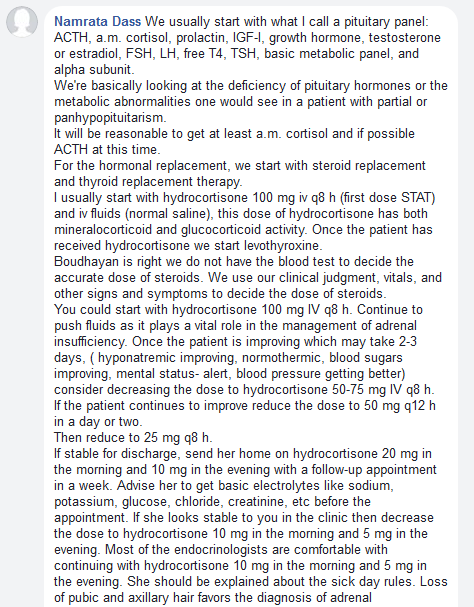This patient is a 60 year old woman with recent vomiting, coma (sodium 107) and clinical features of dull apathy, skin coarsening, bradycardia, areflexia strongly suggesting hypothyroidism. Serum osmolality and urine sodium are suggesting SIADH.
Thyroid profile:
Our patient's current dose of sodium is 10ml per hour and she is having mild hypotension at times and in her blood sugar recordings hypoglycemia (attached below) was noted. In brain imaging, empty Sella is noted (attached below). Most of the data we have till now is suggesting hypopituitarism
Online Discussion:
Thyroid profile:
Our patient's current dose of sodium is 10ml per hour and she is having mild hypotension at times and in her blood sugar recordings hypoglycemia (attached below) was noted. In brain imaging, empty Sella is noted (attached below). Most of the data we have till now is suggesting hypopituitarism
Online Discussion:





















I got a lot of tips and advice those solve existing issues on ... from this article is with step by step process. Best Orthopedic Doctor in Hyderabad
ReplyDeleteI appreciate that you took a simple, how to article by explaining the process step by step and how toAt Sai Sanjeevini Hospital the orthopaedics department provides patients with adequate diagnosis and effective treatment for simple to most complex orthopaedic cases.
ReplyDeleteOrthopedic Doctor in Hyderabad
ReplyDeleteThis post was very interesting and informative. thanks a lot for sharing such great article.best gynecologist centers in guntur
Great post. bone cancer specialist in hyderabad
ReplyDeleteorthopedic oncology specialists in hyderabad
orthopedic doctor in hyderabad
I really appreciate this great post you took. If you are a player, you are probably familiar with the Minecraft game. If you want to become history in this game, you will need to increase your click-through speed. Take this free trial to find out how fast you click. Please click here kohi click.
ReplyDelete